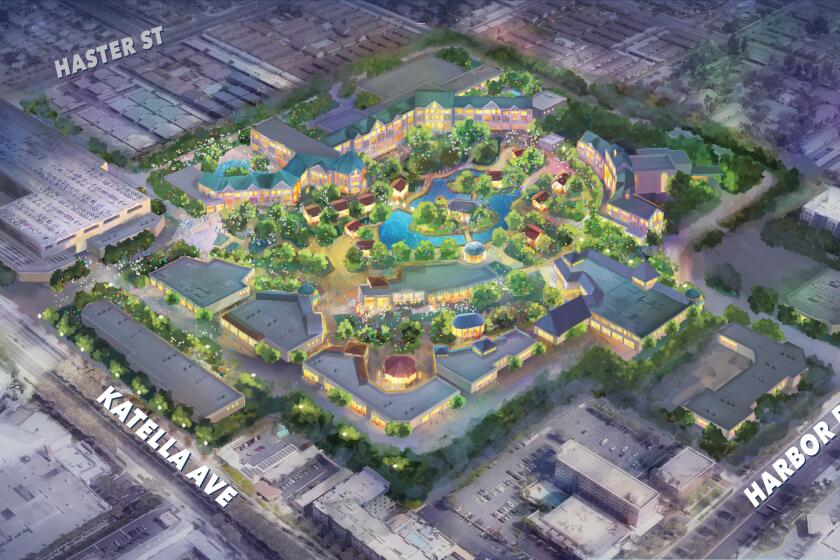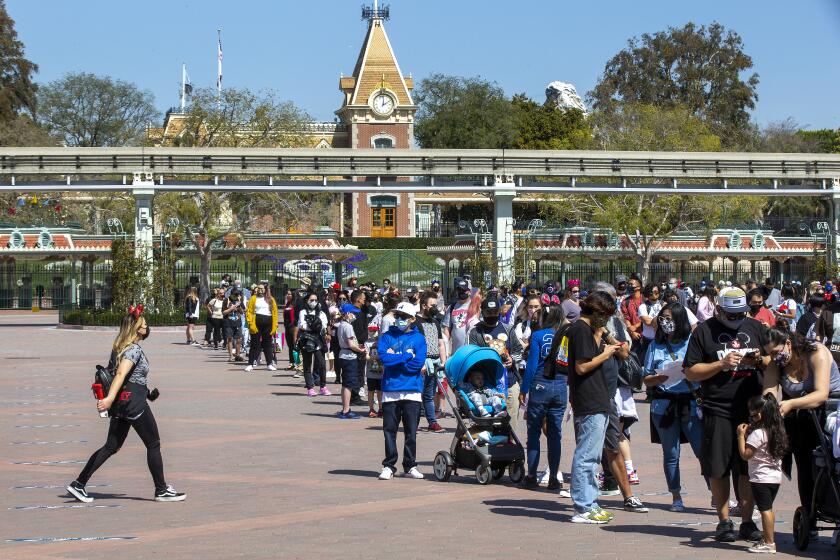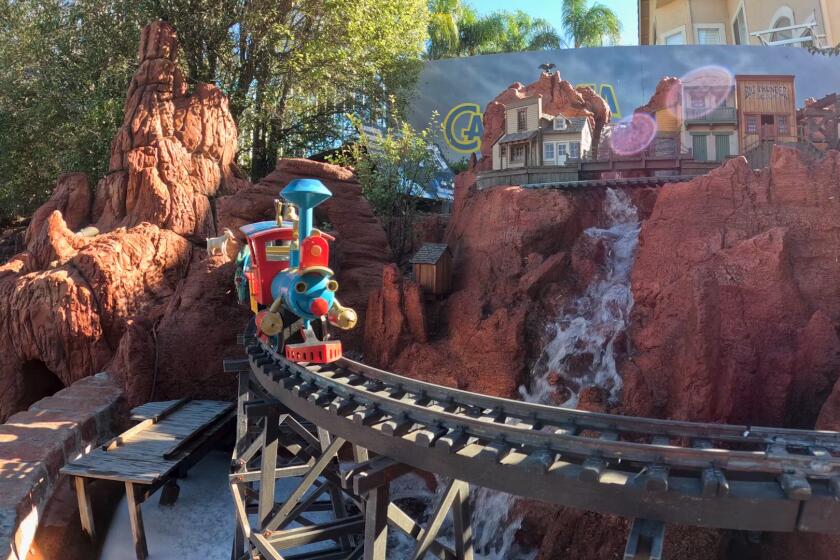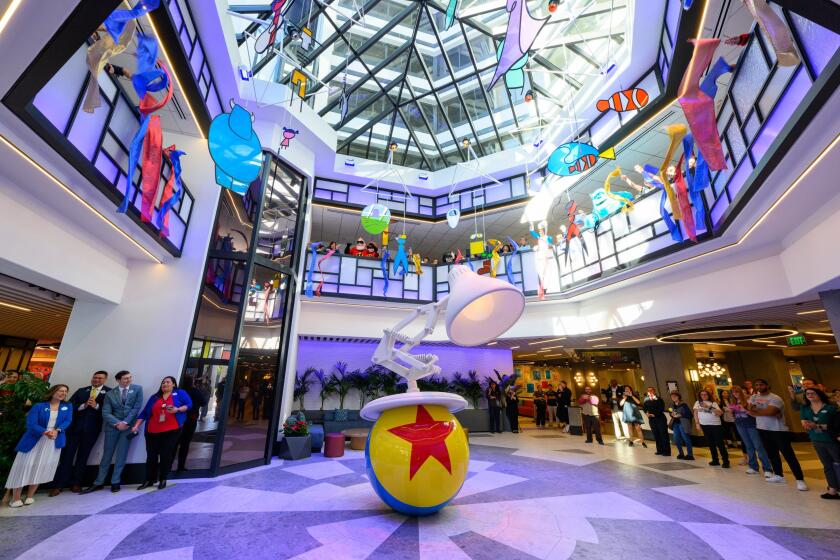Huge Disneyland expansion to add new rides, restaurants and hotels wins OK
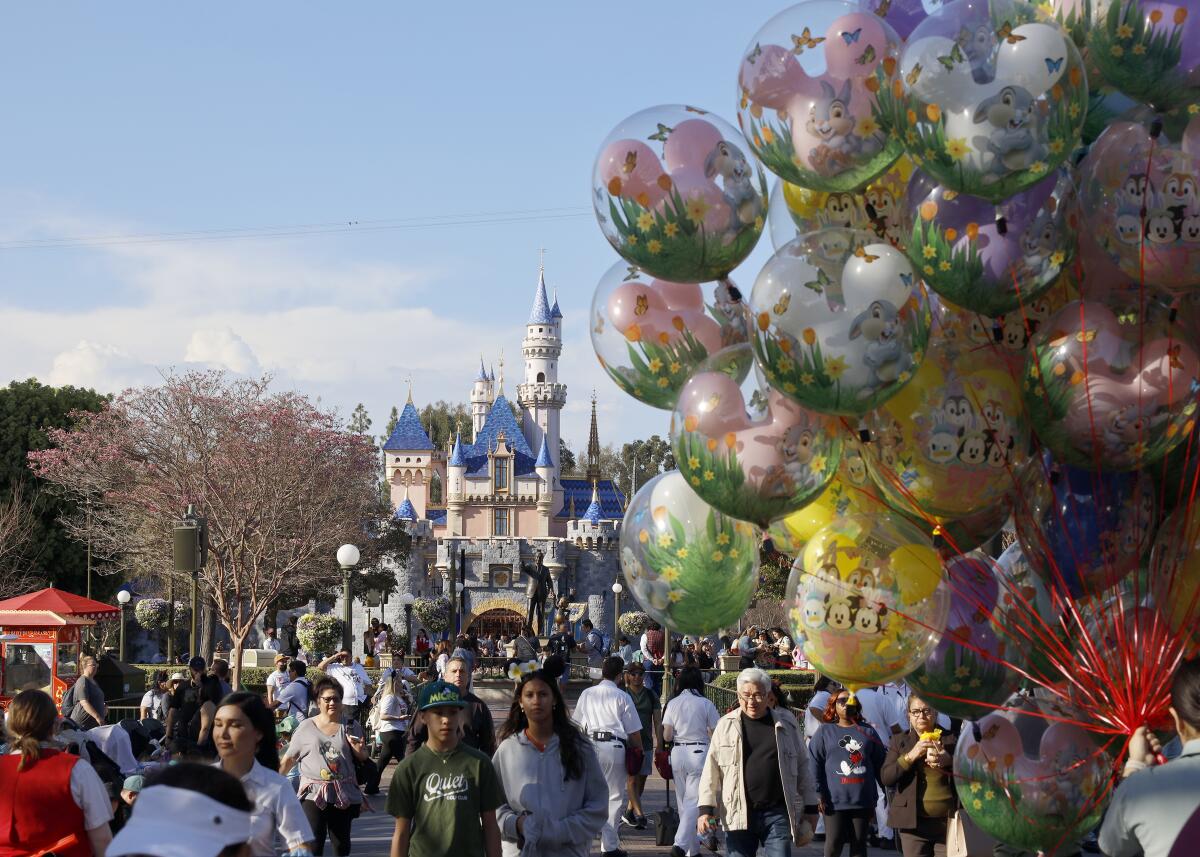
- Share via
Disneyland’s multibillion-dollar plan to reimagine and expand the world famous theme park has won the unanimous approval of the Anaheim City Council, opening the door for one of the region’s largest employers to add new attractions, shops and restaurants.
With a promise from Disney to invest $1.9 billion to $2.5 billion, the plan approved Wednesday marks a historic moment for the park, promising to give Disneyland its most substantial makeover since the 1990s, when it took action to add a park, California Adventure, and a downtown dining district.
The council voted 7 to 0 following an hours-long meeting that started Tuesday evening and ended in the early hours of Wednesday morning, with more than 200 people — including residents, Disney employees, city officials, business associations and union groups — weighing in on a plan expected to affect the city’s future for years.
“Tonight is a decision that has weighed very heavily on [my] mind,” Mayor Ashleigh Aitken said during Tuesday night’s meeting. “As someone that has been quite the vocal critic in the past of some of these projects, I’ve been really surprised in doing my due diligence and reading thousands of pages of documents that this project will bring a benefit to our community, not just in the near future, but decades to come.”
The plan is expected to pose a significant change not just to Disneyland but also to Anaheim as its political and financial future has been tied to the entertainment giant.
“When Disneyland grows, Anaheim thrives,” Aitken said in a statement. “Last night’s vote to approve the DisneylandForward Plan will benefit Anaheim for decades to come.”
The City Council decision also drew the attention of California Gov. Gavin Newsom on Wednesday, who said the investment would drive billions of dollars in revenue for the state and local community.
“Disney is making it clear that California is its home because we provide the welcoming and supportive environment where businesses want to expand and create more jobs,” the statement read.
In Anaheim, the meeting drew so many speakers that some complained there weren’t enough seats in the council chambers, and instead had to wait outside in the cold night air until they could address the council.
Known as DisneylandForward, the plan will give Disney the flexibility to redesign the resort, including Disneyland, California Adventure Park and the Downtown Disney business district into what Disney Global Development Vice President Rachel Alde described as a more “immersive” experience.
Although previous zoning rules restricted hotels, shops, dining, and attractions in their respective areas, the council’s action means the entertainment giant will be able to add attractions alongside, or as part of, those areas where hotels, shops and restaurants are located.
Disney’s investment could also mean millions of dollars more in tax revenues for the city, but some residents and members of the council also aired concerns about other effects that the park’s expansion could have, including raising housing and living costs in the Orange County city. During the meeting, however, elected officials said Disneyland’s promise to also invest more than $100 million for road improvements and affordable housing in Anaheim showed a commitment to the community.
“I do believe the success of [Disneyland] provides a really important way for us to build affordable housing, for us to invest in making our parks in every single district better” Aitken said. “It gives us those resources for police and fire and helps us improve infrastructure.”
‘The fairy dust fades away’: Why the people who play Disneyland’s costumed characters are unionizing
Character performers at Disneyland Resort have filed a petition for a union election with the National Labor Relations Board, per the Actors’ Equity Assn.
Councilmember Carlos A. Leon, said that although there were concerns, the plan included a major business investment in the city without costing taxpayers a cent.
“This proposal includes $1.9 billion of private investment into our city without bonds being issued, without taxpayer dollars or anything from the general fund being used,” he said. “I don’t know of any other private investment of that magnitude that can compete.”
The council’s vote provides initial approval of the expansion plan, with a second, procedural vote expected May 7. If approved then, the plan would require 30 days for changes to take effect.
The council’s action will lead to a series of amendments to zoning rules so that the entertainment giant can add new attractions alongside hotels on the west side of Disneyland Drive as well as rides and new shopping, dining and entertainment to the southeast on what is currently Toy Story Parking Area at Katella Avenue and Harbor Boulevard. The park will not expand outside its current 100-acre footprint , according to the plan.
Exactly what attractions or hotels would be built by Disney is still unclear , but Disney has hinted that attractions being built in parks in Tokyo, Hong Kong and Shanghai represent a possible “inspiration” for Anaheim.
In Tokyo, Disney is looking to build a Rapunzel-inspired land with gondolas. In Hong Kong, a themed section based on “Frozen” has been recently opened to resemble the Norwegian-inspired kingdom of Arendelle, with rides and a restaurant inside a castle.
The Anaheim Planning Commission voted Monday night to approve the DisneylandForward project, which would clear the path for major park development.
Tuesday’s meeting drew hundreds of residents — both supporters and opponents of the project — some of whom stayed until early the next morning for the opportunity to speak and witness the council’s final decision. For those in favor, the project is seen as a jobs creator that will boost the local economy.
Kevin Rafferty, a Disneyland employee and longtime Anaheim resident, said that his parents met while working at Disneyland and that he and his wife met the same way.
“I’m so excited for what the future could look like for the Disneyland Resort in Anaheim,” he said. “Plus [the project] will provide millions of dollars in tax revenue and thousands of new jobs.”
But Disney’s plans, including a proposal to privatize public roads, also raised concerns from some who worried about the traffic impact on the community.
“We have to live with traffic jams on a daily basis, with road closures and detours at the will of Disneyland events as a bonus,” said Trangdai Glassey, who lives near the park. “People come to Disneyland to have fun, but the local residents bear the brunt of endless problems: air pollution, daily traffic congestion and noise pollution.”
Some residents also worried that the expansion could increase rents and the cost of living in Anaheim.
Disney ‘reset’ elements of its Disability Access Service program, or DAS, that has become Orlando’s and Anaheim’s most popular service, a spokesperson said.
The proposal includes a new 17,000-space parking garage, as well as three pedestrian bridges over Harbor Boulevard and two bridges over Disneyland Drive. The plan also asks the city to give Disney control over several adjacent public streets, including Magic Way, Hotel Way and parts of Clementine Street.
Disney executives have contended that the streets they are requesting to take over are already used mostly by visitors making their way to the park. It has proposed paying $40 million to Anaheim for the roads — part of a $90-million investment for street improvements near the park, including a plan to widen Katella Avenue.
In all, Disney has pledged to give the city more than $100 million for street improvements and affordable housing as part of the plan.
Fans can’t get enough of Castle Peak and Thunder Railroad in Anaheim Hills, David Sheegog’s miniature love letter to Disneyland and Disney animation.
Disney has contended that every billion dollars invested already could generate $253 million in economic output for the city, according to a report cited by the company.
According to a city staff report, an economic study on the effect of the expansion stated construction on new sections of the resort and theme parks would produce $11 million in tax revenue annually. Once it was operational it could yield $15 million annually.
But there was plenty of skepticism in the community. An online petition opposing Disneyland’s effort to take over some streets generated more than 500 signatures. Others were concerned that Disney, which already plays a dominant, outsized role as a power broker in the city, could increase its influence and impact in Anaheim.
Everything you need to know about the recently unveiled revamp of the Paradise Pier Hotel on Disneyland Drive.
Some residents grew skeptical about city plans involving Disney after an internal report found a “potential criminal conspiracy” involving COVID-19 pandemic relief funds, former Mayor Harry Sidhu and the former head of the Anaheim Chamber of Commerce.
An FBI affidavit accused Sidhu of being part of a “cabal” of public figures that included a Disney power broker.
But Disney executives defended the plan, saying it could mean thousands of new jobs and millions of dollars in tax revenue for the city.
During the meeting, City Councilmember Natalie Rubalcava also raised concerns about whether the development agreement could block future taxes against Disney, but city staff said the city could impose new taxes, as long as they were imposed citywide.
Hotel transient occupancy tax revenue is Anaheim’s largest source of funding, a city spokesperson said, bringing in $236.3 million so far for the 12 months that will end in June.
More to Read
Sign up for Essential California
The most important California stories and recommendations in your inbox every morning.
You may occasionally receive promotional content from the Los Angeles Times.

